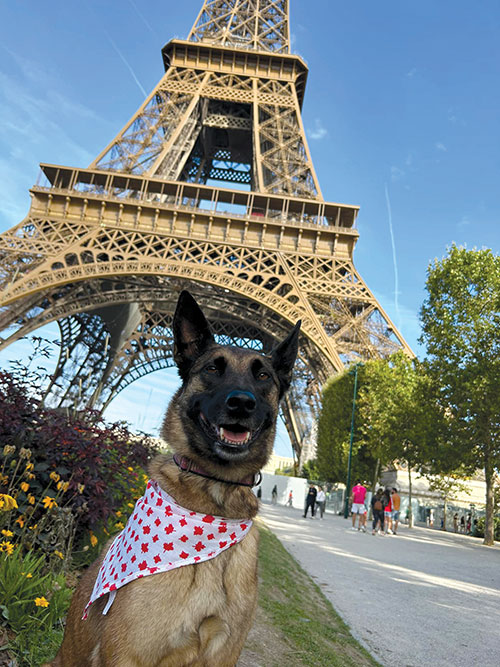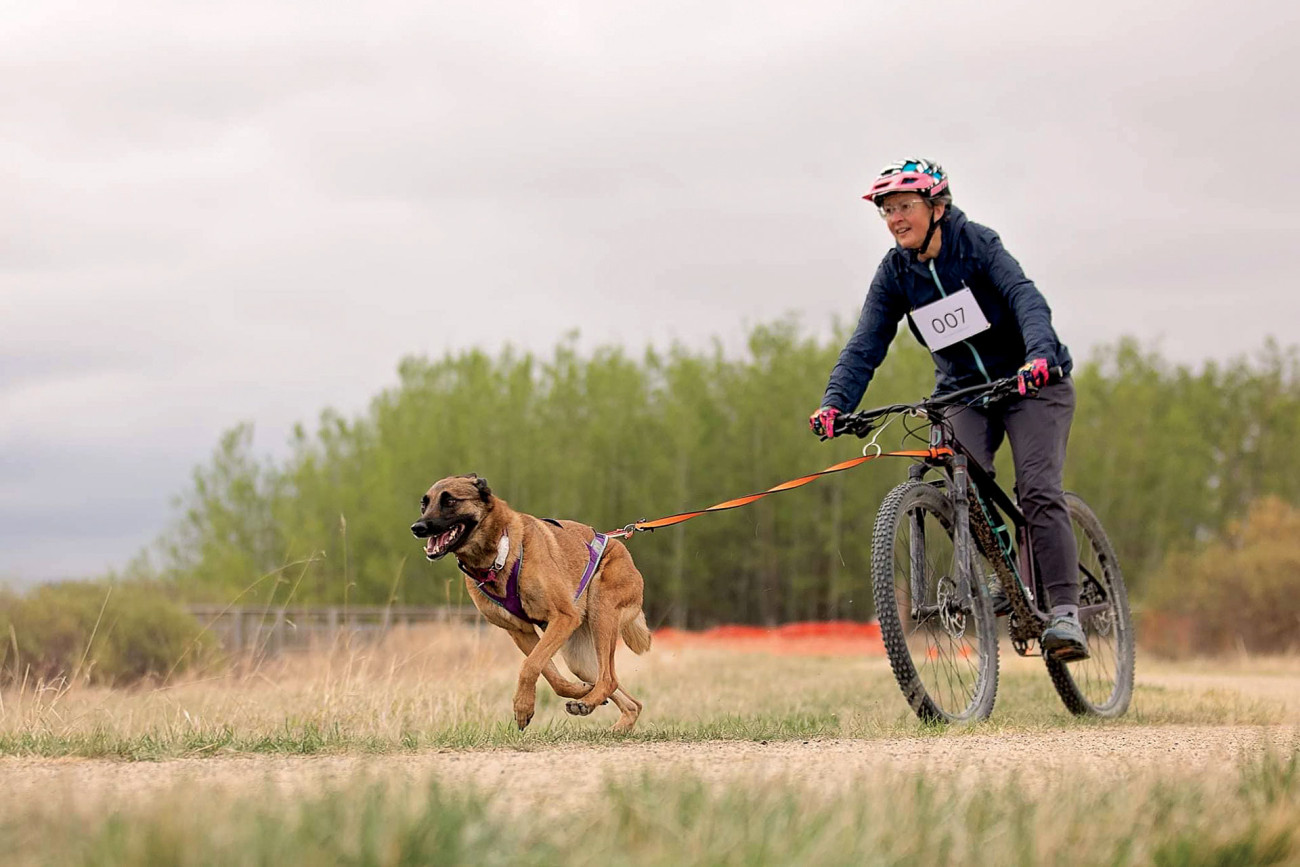
A sleepy rural village in Romania came to life this spring when hundreds of dogs and their handlers descended on the area, prepared to race through the fields, dodge horse-drawn wagons and cheer each other on in every language. Donna McLaughlin, Learning Experience designer in the Centre for Teaching, Learning and Innovation at Lethbridge College, was among the crowds as she and her dog Taboo represented Canada in the Federation Mondiale du Berger Belge (FMBB) international competition, which showcases the talents of Belgian Shepherds.
McLaughlin and Taboo compete in several canine events, originally derived as off-season training for sled dogs, like canicross, bikejoring and skijoring. Canicross is a cross-country running sport where a dog is attached to the handler via a low belt on their hips on a bungee-cord leash. The dog provides the runner extra propulsion forward through the race. Bikejoring and skijoring involve the dog being attached to a bike or handler on skis respectively. The three sports, combined with agility, are the perfect fit for six-year-old Taboo, a Belgian Malinois, which is an intelligent and high-energy breed. McLaughlin, who has spent her life training dogs, horses, llamas and chickens (yes, chickens!) and even dabbled in the world of television with her dogs.
In 2020, McLaughlin was set to compete in canicross for the FMBB competition in France, which was cancelled due to the pandemic. Last year the competition was in Greece, but McLaughlin opted to stay home to be with her elderly dog who was reaching the end of his life. However, the third time was the charm when McLaughlin resolved to finally enter the competition this spring in Romania.
“This was the year,” she explains. “Initially I wasn’t sure about Romania, and then I thought, you know what. We just have to do it. I can run, my dog can run, we’re healthy. We’re just going to do it.”
Taboo had already completed a few practice flights with McLaughlin on visits to Vancouver Island and across the country to Quebec for competitions, but Romania was her first long-haul flight. McLaughlin and her husband Francis Rankin flew with Taboo flew to Hungary first to spend a few days touring before driving to Oradea, a small city just over the northern border of Romania. Taboo handled it all like a pro, and enjoyed the dog-friendly culture in Europe where she was allowed to visit restaurants and shops with her people.
“She’s very comfortable in a kennel, which is critical,” says McLaughlin. Along with careful preparation for feeding and bathroom breaks before the flight, she says Taboo’s breed qualities made for a smooth trip. “They are typically the breed of dog you see doing police or military work so they’re pretty resilient and have tough temperaments. She really handled it all very well.”
Taboo’s resilience would also come in handy during the races in Romania. Rain on the days prior had created muddy conditions, but the two powered through. In Canadian canicross events, competitors race against everyone no matter the age or gender, whereas in Romania racers are divided into age categories. This meant she was only competing against one other racer, a woman from Switzerland, which led to a fast friendship as the two exchanged gifts from their countries and cheered each other on. Although the other woman passed McLaughlin at the end of the first five-kilometre race and snuck past her during their two-kilometre run, she was proud of their results nonetheless.
“We’re both women in our 50s and I think it’s great that we’re running,” she says. “It’s running with my dog that gets me out. She needs a lot of exercise, so it gets us out on the trails and all through the coulees in all kinds of weather.”
Following their experience in Romania, McLaughlin, Rankin and Taboo travelled to France for another competition in August. This time she competed in agility, which she says has slightly different protocols in Europe than in North America. Despite the language barrier, she was not only able to make friends again who helped explain the competition to her, but she says the language of dog lovers transcends everything else.
“When you’re all competing in the same sport, you get past the language and cultural barriers easily,” says McLaughlin. “You know when someone’s had a really good run and you know when someone’s had a heartbreaker even if you don’t totally understand what people are saying. You just get it.”
And, although she didn’t place among the 130 competitors in agility in France, McLaughlin’s optimism continues to shine. “I wasn’t the worst, but I wasn’t the best. But it turns out that being in France and not qualifying on a run is more fun than being in Canada and not qualifying on a run.”
McLaughlin and Taboo continue to train and work on their agility in hopes to qualify for the next FMBB competition, which will be in Italy next year. She is a member of a local group, Lethbridge Mushers, who organize and participate in races throughout Alberta and encourages others to consider these kinds of sports, especially if they have a high energy dog and are looking for ways to be more active.
McLaughlin’s tips for trying out canicross/bikejoring/skijoring
- Get a bungee leash and belt that sits low on your hips so your dog doesn’t pull you off balance. You don’t want the belt pulling from your waist.
- Start on foot until your dog learns to run ahead. McLaughlin says single track trails are the best because they don’t have as many distractions for your dog.
- Join a group! Dogs will learn to follow other dogs, and it will help socialize your dog and get them used to being around and passing others.
- Got a dog that pulls on the leash? McLaughlin says, “get them a harness and make use of it!”



